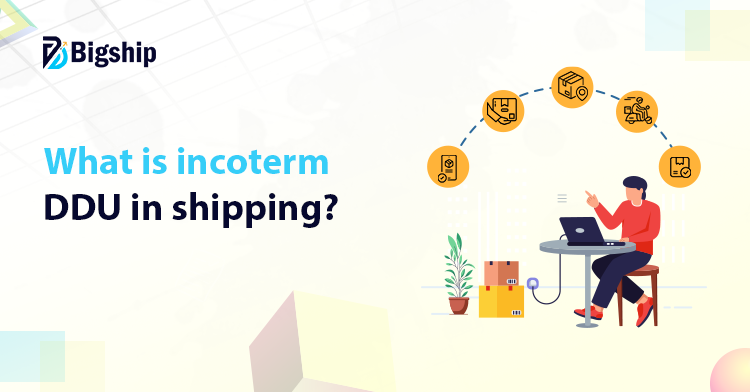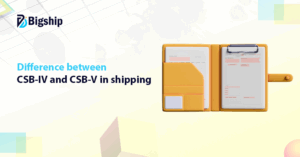In global trade, sellers and buyers often rely on shipping terms to decide who pays for what. One such term is DDU shipping terms. The DDU full form in shipping is Delivered Duty Unpaid. Under this method, the seller delivers goods to the buyer’s country but does not cover import duties or taxes.
The DDU incoterm was once part of official trade rules but was later replaced. Still, people continue to use this term in shipping conversations. It is important for you to understand what DDU means, what role it gives to exporters and importers, and how it differs from other shipping terms.

What is DDU in shipping?
DDU stands for Delivered Duty Unpaid. It is an old trade term that was once part of Incoterms. In this arrangement, the seller takes care of moving the goods to the agreed destination. The seller also pays the transport charges and carries the risk until the goods arrive.
Once the goods reach the buyer’s country, then he or she has to pay customs duties, taxes, and any extra local charges. That is why it is called “duty unpaid”. The seller delivers the goods, but the buyer clears them and pays the duties.
DDU is no longer part of the official Incoterms since 2010. But you may still hear people using this term in global trade. It works much like other delivery agreements, where the roles of seller and buyer are clearly divided.
Seller’s obligation under DDU
Under DDU, the seller plays a big role in the delivery process. In DDU shipping, the seller carries most of the duties until the goods reach the buyer’s country. Here are the main obligations:
Preparing the goods: The seller makes the goods ready as per the contract and attaches all needed documents.
Completing export clearance: The seller takes care of customs formalities in the home country before the goods leave.
Arranging transport: The seller books and pays for the main transport to send the goods to the named destination.
Taking responsibility during transit: The seller carries the risk of loss or damage until the goods reach the agreed location.
Handing over transport papers: The seller gives the buyer the transport documents so the buyer can collect the goods.
Buyer’s obligation under DDU
In DDU shipping, the buyer takes responsibility once the goods reach the destination. Under DDU Incoterms, the buyer must handle duties, taxes, and other local requirements. The main duties of the buyer are mentioned below:
Paying for the goods: The buyer clears the payment as agreed in the sales contract.
Arranging import clearance: The buyer manages local customs, permits, and authorizations required to bring in the goods.
Taking delivery: The buyer takes charge of the goods once they are handed over at the agreed location.
Accepting risk at destination: The buyer carries the risk of the goods after they are made available at the destination.
Covering local charges: The buyer pays import duties, taxes, and other local transport costs related to the cargo.
Advantages of DDU in shipping
DDU shipping gives more control to the buyer once the goods reach the destination country. It also reduces the seller’s burden for local formalities. Some of the key advantages are:
More control for the buyer: Buyers can manage local customs and keep track of the shipment process.
Better cost management: Buyers know their country’s rules, so they can control expenses more effectively.
Easier tracking: Buyers stay updated about shipments and handle them as per their local system.
Less responsibility for the seller: The seller only delivers the goods to the agreed destination and avoids local formalities.
Disadvantages of DDU in shipping
While DDU Incoterms may give buyers more control, it also comes with certain risks. These challenges can affect both buyers and sellers. Some of its drawbacks include:
Unexpected duties and taxes: Buyers may face surprise charges at customs, which can create problems.
Risk of delays: Errors in paperwork or customs procedures can slow down the delivery.
Possible disputes: Extra charges at arrival may upset buyers, and sometimes they may refuse the shipment.
Difference Between DDU and DDP
Incoterms DDU and DDP have different meaning when it comes to international shipping. Some of the basic point of distinction between the two terms are mentioned below.
| DDU (Delivered Duty Unpaid) | DDP (Delivered Duty Unpaid) |
| Buyer pays import duties, taxes, and local charges after goods arrive. | Seller pays all import duties, taxes, and charges before delivery. |
| Buyer handles customs clearance at the destination. | Seller completes customs clearance in the buyer’s country. |
| Risk shifts to the buyer once goods reach the agreed location. | Seller carries the risk until the goods are delivered and cleared. |
| Buyer may face surprise charges or delays at customs. | Buyer avoids unexpected customs costs and delays. |
How Bigship simplifies international shipping?
Bigship makes international trade easier for businesses by handling complex shipping needs in a simple way. Be it is DDU shipping or any other incoterms, you get clear guidance on roles, costs, and responsibilities. Bigship connects you with reliable courier partners and ensures a smooth movement of goods to global destinations. You save time as Bigship manages paperwork, tracking, and delivery support. This further gives you confidence to focus on business growth while your shipments reach safely.
Key Takeaways
- DDU meaning in shipping is Delivered Duty Unpaid.
- DDU shipping was once an official Incoterm but got replaced in 2010.
- In DDU, the seller pays for transport until the agreed destination.
- Import duties and local taxes are always the buyer’s responsibility.
- DDU gives buyers more control over local costs and procedures.
Conclusion
DDU shipping terms may no longer be part of the official incoterms, but they are still common in trade discussions. The DDU Incoterm explains the balance of responsibility between exporter and importer. The seller handles transport until the goods arrive, while the buyer manages duties and customs clearance.
Bigship helps businesses handle such shipping needs with clarity and ease. With expert support, paperwork, and reliable courier partners, global trade becomes simpler for you. So sign up with Bigship and make international trade efficient.
FAQs
What is DDU meaning in shipping?
DDU means Delivered Duty Unpaid, where the buyer pays import duties and taxes.
Is DDU an official Incoterm now?
No, the DDU Incoterm was removed in 2010, but people still use it.
Does DDU shipping give more control to the buyer?
Yes, buyers control customs, taxes, and local costs under DDU.





